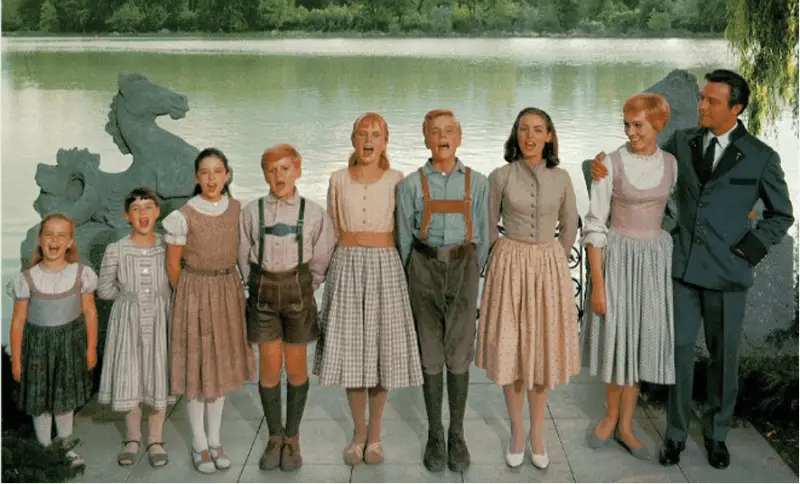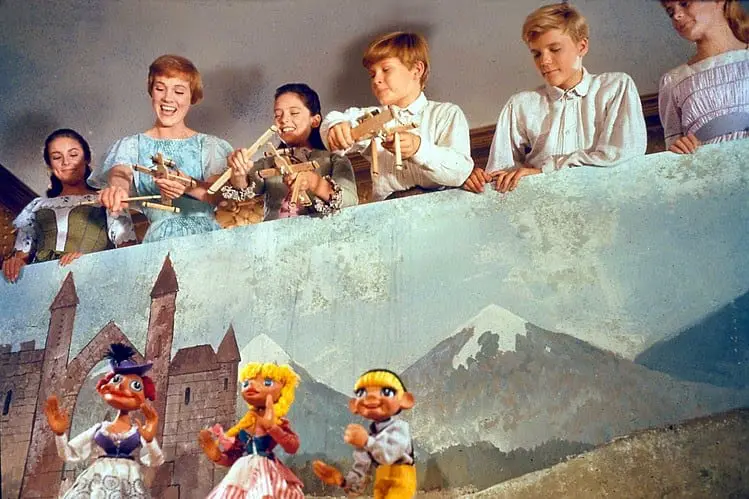I am a fan of musicals. Okay, I am a fan of Stephen Sondheim musicals, but sometimes I think other ones are pretty dandy. To me, it’s the form of fiction that’s the most evocative, just by the inherent way the songs inform and enhance the emotionality of the character moments. There’s also the “rewatchability” of them in the sense that you can revisit the story and the feelings of the actors by relistening to the soundtracks, and getting oddly defensive about whatever version of it you heard first.
However, I fully understand why people struggle with the medium, particularly in the context of our gritty, dark, realistic visual storytelling on film and TV lately. There’s an authenticity that’s trying to be captured, with the exception of the few films and shows that are purposefully unique in this regard, or animated works. Disney classic movies are often musicals, of course, but we allow them because they’re “for kids,” and we’re already somewhat outside of the constraints of capturing ‘genuine’ emotion. I’m not saying animation can’t be evocative-have you ever read my writings on Legend of Korra?-but rather, there already is a bit of separation from the audience given that the characters’ depiction are…you know, cartoonish.
The thing about musicals is that in their proper form, it’s hard to say there’s realism. Actors talk in a somewhat stilted fashion, projecting to the back of a large theater, and then burst into song. That’s the necessity of the medium, and of course it can be deadly effective at getting the audience to feel something, or tell a powerful message, because it’s created with that space in mind. I am a blubbering mess at the end of Assassins, and yet if I were to watch it brought to a TV screen…I can’t see it landing nearly as effectively. The camera lens has a way of grounding the audience in the sensical where something like Squeakie Fromme and Sara Jane Moore sitting together on a park bench would be exceedingly difficult to pull off with any bit of seriousness (or at the least, a lack of awkwardness).
Now, the most successful movie musicals do one of two things: they sort of ignore that the audience isn’t in the theater and still sing and dance as if they’re onstage, relying on the strength of narrative and score to pull them through, or they never try to take themselves seriously. Compare The Sound of Music to Into the Woods, for instance. In my opinion, they’re both fabulous at capturing the spirit of the original musicals, but you can see where the former relied on the stage version’s blocking, while the latter went full movie-mode in cinematography, instead cutting the songs and characters that wouldn’t work. No narrator, no dad hiding in the bushes, no “Ever After.” Sure, that slightly watered down themes, but they were still largely present, and the tone was perfect.

The problem is, not every musical has a lighthearted playfulness of Into the Woods, and the style of The Sound of Music adaptation feels quite dated. (Which is not to discredit it…it’s wonderful and I’ll rewatch it happily any day.) Unsuccessful contemporary adaptions, meanwhile, sort of flounder with tone. It’s pretty obvious why: there’s singing. Characters burst into song, and in a world of more realistic films…that’s gonna stand out.
Les Miserables (2012) was probably the best example of that issue; we have these dark and gritty extreme closeups, but then over-the-top musical numbers that were never meant to be sung on an intimate medium. Director Tom Hooper thought the key was live-singing, to capture the spirit of the musicals, but instead that ended up constraining both the musicality of the performance and the movie as an art form. He took a method for one medium that was never meant to be used in another.
The root of this issue, and I know people might disagree with me, is that musicals aren’t particularly literal pieces of art. Because, and not to shock you: people don’t actually behave the way that they do in musicals. Should we assume the townsfolk had literally coordinated and rehearsed melodic insults for Belle as she walked by in Beauty and the Beast? Of course not. Instead, we can kind of assume that the opening musical number conveniently conveys Belle’s experience and isolation within the poor provisional town, while also serving as a clever mechanism to introduce a few key characters. It’s emotionally what’s happening, but not specifically what’s happening.
This means that songs occur out of the world of the musical, or are “non-diegenic.” Linsday Ellis provides an excellent breakdown on the use of diegesis within musicals specifically if you’d like more context, but hopefully it’s clear that the reason we can’t accept most musicals on the TV and movie screen is that we understand the songs are for our benefit. Well, in 9/10 cases.

This is something our modern day filmmaking doesn’t have a high tolerance for, unless the setting is heavily speculative or absurd. There’s an increasing literalism, and frankly one need look no further than the backlash at Snoke’s lack of a backstory to glean what contemporary audiences have come to expect from films and TV shows. How can nonliteral and clearly character-breaking musical numbers possibly fit in?
Enter Crazy Ex Girlfriend and perhaps the most clever command of diegesis I’ve ever come across.
Now, I’m guessing some of you want to argue off the bat; after all, we’re talking a dramedy on the CW…in what universe is that the same serious tone of most modern TV? Well, it’s not. If it was I probably wouldn’t be watching, because I’m pretty damn burnt out on that. However, its foundation, as humorous and optimistic a packaging as it is, is the very real struggles of people within our world, navigating life as best they can. The subject matter isn’t remotely absurd, speculative, or light; an overbearing mother, infidelity, launching a career ambition, the stigmatization of mental illness, floundering when your friends have figured themselves out, redefining how you relate after coming square with unhealthy habits.
And yes, the characters burst into song in the middle of all that.

Crazy Ex Girlfriend‘s main plot is about exploring the psyche of Rebecca Bunch and deconstructing the “crazy ex girlfriend” concept with this very flawed, very fallible character. It’s clear she’s not healthy, making impulsive, self-destructive choices from the word “go.” It’s also clear that Rebecca tries to spin her questionable actions to fit into some neatly packaged narrative, one that is usually taken to task by the show.
As an example, her romance with Greg followed the beats of the trope when there is an unlikely suitor in the friend who has been there for her this whole time. Except, nope! He’s a mess with his own issues who was drawn to her because of her seemingly emotional unavailability.
Still, Rebecca spends most of the show navigating her foibles by “singing” about the situations and imagining her friends doing the same. At first they all seem like typical non-diegenic musical interludes; we understand Josh Chan’s family didn’t participate in a flash mob at their own thanksgiving so Rebecca could perform a dirty rap about seducing his parents. Even the songs that occur entirely away from Rebecca make it clear it’s symbolic of the central character’s fantasy of that number, unless we’re to assume that Darryl literally brought a saxophone into his office to announce his bisexuality to his staff. Everything we get is watered through the lens of Rebecca and the narrative she’s painting, which in turn becomes the mood and style of the show.
Yet even from the very first episode, cracks in the non-diegenic framework show. The rapper Rebecca imagined in her “Sexy Getting Ready Song” gets so horrified by the performative femininity Rebecca feels she has to take part in that the episode ends with him calling up dancers from his other music videos and apologizing. A reprise of a song Rebecca imagined Greg singing her turns up mid-Season 1, sung by Heather to Greg. When Greg later sings a goodbye to Rebecca in “It Was A Shitshow,” she quotes a very specific lyric to Paula, as if it was truly sung to her.
“Yes, it is! He left and he called our relationship feces.”
As the show has gone on, this trying has only become more pronounced. Rebecca’s “Period Sex” song is reprised by herself, then later sung by her mother. Her own “confession” to Josh in the reprise of “After Everything You Made Me Do (That You Didn’t Ask For)” not only echoes Paula, but includes an info-dump Josh tries to tell his friends about, and Rebecca worries might be used against her for a case. Heather gets a musical number where she complains about the concept of a musical number the whole way through. It all finally reaches a peak when Josh Groban performs a heartfelt song about life not making narrative sense to Rebecca, with himself cast only as an extra in her own story.
We are given an in-verse explanation by Rebecca after she receives a diagnosis; she sometimes listens to music and watches music videos to help make sense of things happening around her. This was clear and accessible, but having her vocalize it really put a pin in what the show was seeking to accomplish, and how we should feel about it. We can still call most numbers safely non-diegenic, even the ones like “Dream Ghost” where Rebecca herself seems uncertain. However, the emotions conveyed are true to the situation, and we understand it’s part of Rebecca’s journey in how she frames her life and what she seeks to get out of it.

The important part isn’t that the show occasionally lampshades the musical numbers, or even tinkers with the diegesis; what matters is that the writers understood it as a concept and had intentionality with their choice. It’s a musical where the songs comfortably straddle the line between in and out of verse, and the audience is able to by in because that blurriness is also the driving beat: Rebecca’s self-conception, as well as those around her.
Does that mean Les Miserables should have blurred the diegenic line more? I fail to see how actual singing school students could have been been anything but ridiculous. However, with that musical’s non-diegenic songs, the choice for hyper-realism and grit in all other aspects of the movie created a tonal mix. Likewise, dropping all music in favor of dialogue in something like Into the Woods would make the story fall flat.
It’s the awareness of diegesus on the part of movie and TV makers where tone is set. And to that, Crazy Ex Girlfriend offers a Masters’ class. Because at the end of the day, it deconstructs the damn concept of a musical, too.

Let’s just hope future musical adapters take note.

